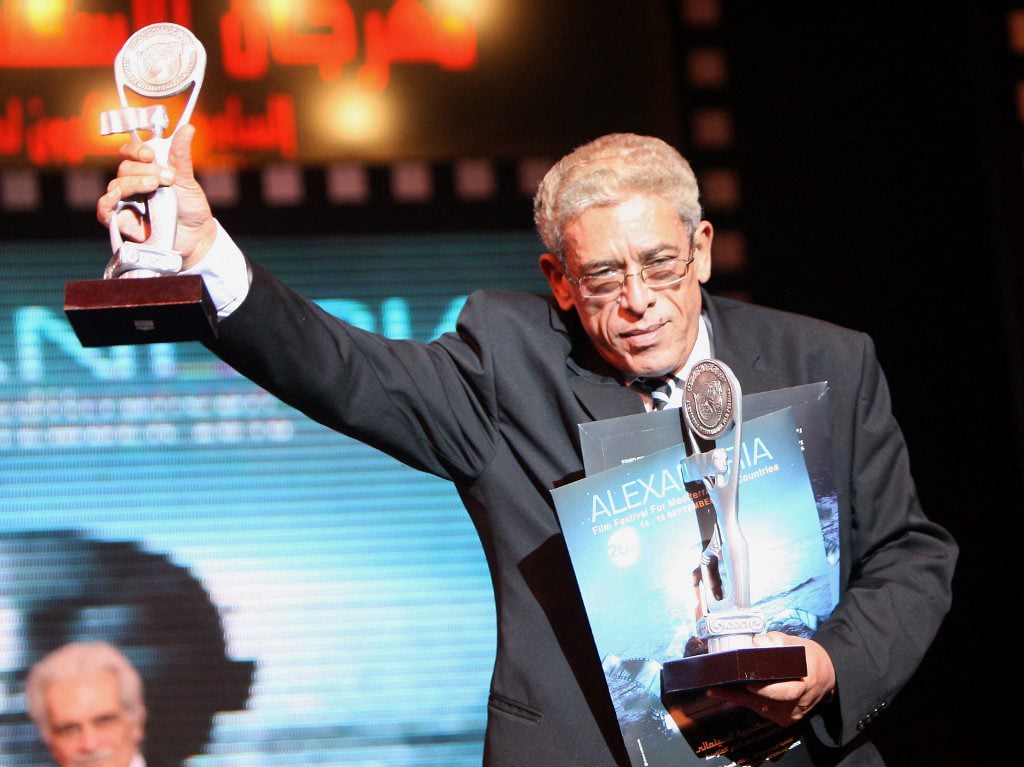
Khaled Mahmoud
“The audience has changed. Therefore, I have to say goodbye.”
That is how film director Daoud Abdel Sayed summed up the cinematic scene and perhaps also Egypt‘s cultural and literary scene.
Abdel Sayed occupied public opinion by announcing his official retirement.
I am not saying that the director, who has been absent from work, particularly since 2015, after his latest film, “Qodorat Ghair Adiyah,” has officially retired. Whoever wants to retire from public life would do so without noise.
But the director of only seven films has thrown a stone into the stagnant waters of the cinema industry in Egypt.
The successive ripples did not achieve their goal, considering that no one from the presidential palace, the government or the Ministry of Culture contacted him.
There were only the audience’s whispers and amazement at the timing and reason.
In his words, Abdel Sayed blamed his viewers, who had changed.
Although he dedicated his films to the middle class and urban movies, he believes the audience was intentionally obscured.
He pointed his finger towards the state. Nevertheless, there was no answer. No one had a clear reply to what he said.
After his talk with the hard-working anchor Kaswaa al-Khelaly, Abdel Sayed back-tracked to say that he had not announced a decision to retire and that he had not thought in advance of what he would say. However, Khelaly said that Abdel Sayed informed her that he would behind the scenes.
Regardless of that, the dialogue again drew attention to the value of the content that Khelaly presented in her TV show, given that he chose that media platform “to end his artistic career that is consistent with the diversity and seriousness of his human, intellectual and cultural interests.”
Dr Hala al-Saeed, Minister of Planning and Economic Development, spoke about the state’s commitment to supporting visionaries in the media. The goal is to benefit from Egypt’s distinguished history in artistic production and production, in addition to transforming ideas into significant investment opportunities that contribute to reshaping the scene and lead sustainable growth.
The rhetoric resulted in only one public-private partnership deal, as Egyptian banks are still reluctant to play the role of a producer or investor, fearing the resulting risks.
What is happening here is that the Egyptian cinema, which suffers from massive problems, is losing much of its lustre in favour of foreign parties loaded with suspicious agendas.
For example, the call to accept homosexuality and practices outside marriage in Egyptian society, as presented by the movie “Ashab Wala A’azz,” produced by Netflix, which is known for adopting actions against traditional Arab social values and pro-Israel, rings the alarm bell.
In my opinion, the Egyptian actress Mona Zaki did not need a film to highlight her acting abilities, nor for the handsome pay. However, she was a Trojan horse to force viewers to a moral lesson, which the West demands Arab societies adopt.
While a new cinema is emerging in the Gulf region, a study published in 2020 by the Egyptian Center for Economic Studies urged the government to return to the film industry as a labour-intensive and economically promising sector. The centre’s advice included following specialised support programs as other countries did. Moreover, the state has to play its role as an industry regulator, not a direct participant in production or distribution.
It called for banks to study the film industry’s financing needs, given that they consider its unique nature, through consultations with its makers.
Away from the cinematic aspect of Abdel Sayed’s words, in general, it also raises important questions about when the intellectual can retire? Or rather, when can they raise the white flag and surrender to his inevitable end?
But the question that goes beyond the private to the public arises again in the Egyptian arena, whose intellectuals revolve around themselves in a closed-loop, demanding government support and rejecting its dominance over their creative activities.
Abdel Sayed chose to announce his retirement from the cultural scene. However, he still attends conferences, seminars and festivals. Meanwhile, many others still seek to change this scene and refuse to announce their resignation or retirement.
Creative work indeed has no age, but it is also true that the relationship of the intellectual with authority is now more ambiguous than ever.
Perhaps this was the most critical aspect that Abdel Sayed put forward in his talk to Kaswaa.
However, exclusion here is not a luxury, or a self-made choice, in a republic that President Abdel Fattah al-Sisi believes is new, after decades that contributed to the erosion of the Egyptian state, along with the awareness of Egyptians to a large extent.
Perhaps it is time for Sisi to listen to his country’s intellectuals face to face in an inclusive conference, and it is also time for him to entrust the cultural portfolio, like the absent media, to a real intellectual, not just a public official in the state.
There is a big problem that we need to tackle in this regard. Still, like lovers, intellectuals do not withdraw or raise the white flag and do not retire voluntarily, especially if their primary concern is the people and nothing else.
But that is a story for another time!
DISCLAIMER
The opinions expressed in this publication are those of our bloggers. They do not purport to reflect the opinions or views of Fanack or its Board of Editors.


